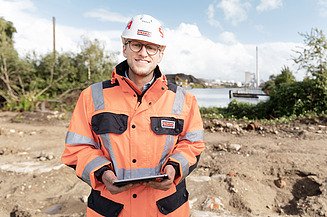Building for generations. And for the future of our homeland.

As a leading construction technology group, we have for many years been pursuing the goal of being able to build in a resource-conserving and climate-neutral way in the future. The recycling of valuable secondary raw materials, i.e. materials that have already been processed, and the associated protection of natural resources is more important than ever for achieving our climate targets.
The fact that we are now allowed to develop the old oil port into a competence center for urban mining and construction waste processing after a long period of preparatory work - the intensive development of a sustainable and pioneering after-use concept - not only offers us the opportunity to demonstrate our expertise in both the remediation and processing of construction materials, but also to make a valuable contribution to the implementation of our city's or region's climate targets and CO2 reduction.
As a small federal state, Bremen has to import almost all the materials needed for construction. Even the materials that are generated during deconstruction are downcycled at most, but mostly just dumped and transported over hundreds of kilometers for this purpose.
Around 60 million tons of raw materials are used in the existing buildings in which we live. In the future, we want to bring the mixed construction waste that is generated during demolition to our site and divide it into the individual fractions there. In this way, the individual raw materials or aggregates can be used again in certain products and reused for construction. We do not want to process construction waste into "low-grade landfill substitute material", but recycle demolition materials and concrete in such a way that they can be reused in top quality and make the use of new raw materials obsolete. In short: enabling closed-loop recycling in the construction industry.
In the future, our environmental technology Group units will use the site for their own work and develop it into a technology and research location. In the medium term, around 130 employees will work here. In addition to the STRABAG-internal workplaces, it is also planned to establish a start-up campus with co-working spaces in the laboratory, workshop, production and technical areas for research on the topic of construction waste recycling and urban mining. In this way, we want to cooperate specifically with universities, testing laboratories and institutes that have a close connection to urban mining and bio-economy. Together with these partners, we want to find new materials that have not yet been recycled and achieve market maturity for even the finest aggregates. In the long term, this work and research platform is to develop as a competence center and show what the circular economy of tomorrow will look like.